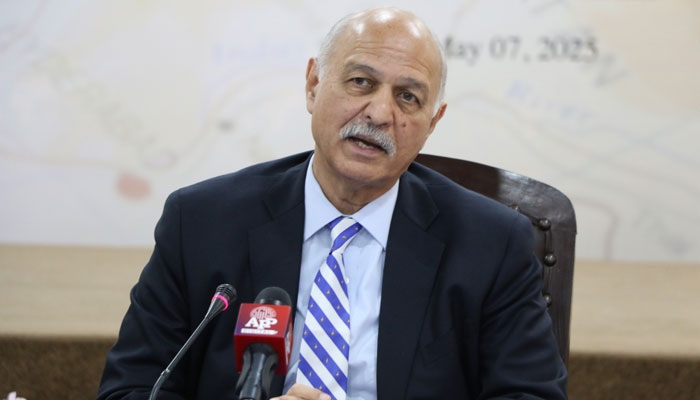‘RSS mindset another form of non-traditional security threat’
Islamabad:Former Senator Mushahid Hussain Sayed has said that non-traditional security challenges continue to pose difficulties to regional connectivity which include climate change, population growth and religious extremism.
Mushahid was addressing as Chief Guest a one-day International Conference on “Pakistan and the region: enhancing regional connectivity, addressing non-traditional threats and countering terrorism” hosted here by Institute of Strategic Studies Islamabad (ISSI).
Mushahid said that in some cases, challenge sponsored by the state remain serious. He said there is a lot of cultural compatibility in the region and that there is emerging regional connectivity under projects like CPEC and BRI. He said his region is the centre of gravity for regional connectivity. He further said that organisations are emerging which promote this kind of connectivity and an example is the ECO. There is also an initiation of several projects like TAPI, IPI and other railway projects.
While talking about the midnight aggression by India, he said that it was unprovoked and India tried to link Pakistan with the incident in Pahalgam without any proof, as has also been stated by the international media. Blaming Pakistan has been their previous pattern, however, some redlines were crossed and Pakistan was giving befitting response. Pakistani civilians have been attacked, resulting in the martyrdom of many and injuring several others.
He also cautioned about the RSS ideology and mindset which was another form of non-traditional security threat in the region. Arno Kirchhof, Charge d’Affaires, Embassy of Federal Republic of Germany, emphasised that this conference served a vital purpose in exploring how nations can address security risks and work towards achieving peace through dialogues that focus on key regional security issues such as stability, climate change, regional connectivity, humanitarian challenges and countering terrorism.
He noted that the world is in a reflective period, with countries like Germany still seeking solutions to these complex challenges. Earlier, Amina Khan, Director, ISSI, in her welcome remarks, emphasised that the evolving situation in the region presents both significant challenges and meaningful opportunities for Pakistan, directly impacting its foreign policy, security landscape and regional economic ambitions. She highlighted Pakistan’s strategic position at the crossroads of South, Central, and West Asia, underscoring its commitment to fostering stable and cooperative ties with Afghanistan and enhancing regional connectivity for mutual prosperity. She reaffirmed Pakistan’s unwavering stance against terrorism and its continued advocacy for collective security efforts, intelligence sharing and coordinated counter-terrorism measures. She concluded by noting that while the challenges are considerable, they offer Pakistan a vital opportunity to define its role as a constructive and responsible power. At the outset of the proceedings, a one-minute silence was observed to honour those martyred due to Indian aggression.
-
 Jennifer Aniston Already Decided Her Wedding Dress?
Jennifer Aniston Already Decided Her Wedding Dress? -
 Prince Harry, Meghan’s Hollywood Party Drama Exposes Chaotic PR Strategy
Prince Harry, Meghan’s Hollywood Party Drama Exposes Chaotic PR Strategy -
 Jennifer Garner Reacts To Savannah Guthrie's Video As Search For Nancy Guthrie Continues
Jennifer Garner Reacts To Savannah Guthrie's Video As Search For Nancy Guthrie Continues -
 Bad Bunny Leaves Fans Worried With Major Move After Super Bowl Halftime Show
Bad Bunny Leaves Fans Worried With Major Move After Super Bowl Halftime Show -
 Captain Jason Talks Personal Hardships He Faced Ahead Of 'Below Deck' Season 4
Captain Jason Talks Personal Hardships He Faced Ahead Of 'Below Deck' Season 4 -
 Anti-monarchy Group Reacts To Prince William, Kate Middleton Statement On Epstein Scandal
Anti-monarchy Group Reacts To Prince William, Kate Middleton Statement On Epstein Scandal -
 Andrew 'must' Apologize Not Wider Royal Family For Jeffrey Epstein Links
Andrew 'must' Apologize Not Wider Royal Family For Jeffrey Epstein Links -
 Super Bowl 2026: Why Didn't Epstein Survivors Ad Air On TV?
Super Bowl 2026: Why Didn't Epstein Survivors Ad Air On TV? -
 'Harry Potter' TV Series Exec Teases 'biggest Event In Streaming': Deets
'Harry Potter' TV Series Exec Teases 'biggest Event In Streaming': Deets -
 Camila Mendes Finally Reveals Wedding Plans With Fiancé Rudy Mancuso
Camila Mendes Finally Reveals Wedding Plans With Fiancé Rudy Mancuso -
 Beatrice, Eugenie Blindsided By Extent Of Sarah Ferguson’s Epstein Links
Beatrice, Eugenie Blindsided By Extent Of Sarah Ferguson’s Epstein Links -
 Girl And Grandfather Attacked In Knife Assault Outside Los Angeles Home
Girl And Grandfather Attacked In Knife Assault Outside Los Angeles Home -
 Super Bowl Halftime Show 2026: What Did Trump Say About Bad Bunny?
Super Bowl Halftime Show 2026: What Did Trump Say About Bad Bunny? -
 Piers Morgan Defends Bad Bunny's Super Bowl Performance, Disagrees With Trump Remarks
Piers Morgan Defends Bad Bunny's Super Bowl Performance, Disagrees With Trump Remarks -
 Andrew Lands In New Trouble Days After Royal Lodge Eviction
Andrew Lands In New Trouble Days After Royal Lodge Eviction -
 Instagram, YouTube Addiction Case Trial Kicks Off In California
Instagram, YouTube Addiction Case Trial Kicks Off In California




